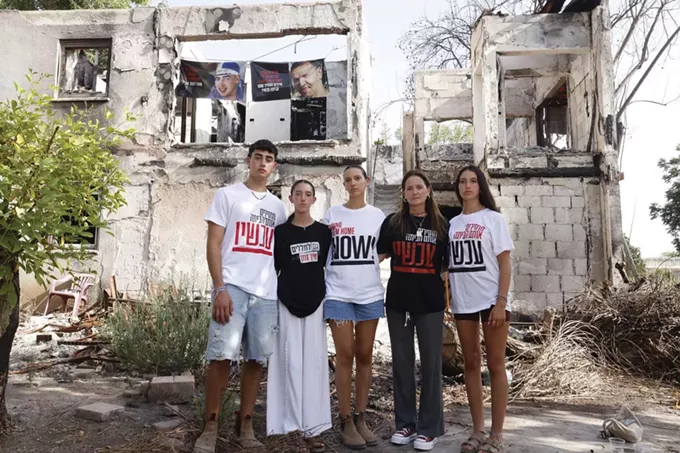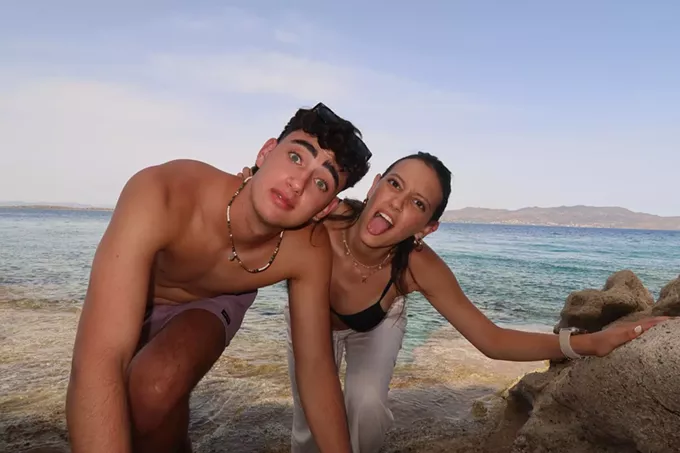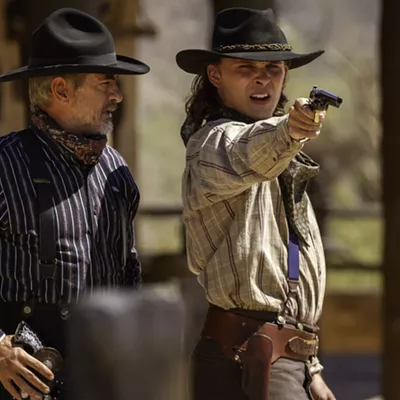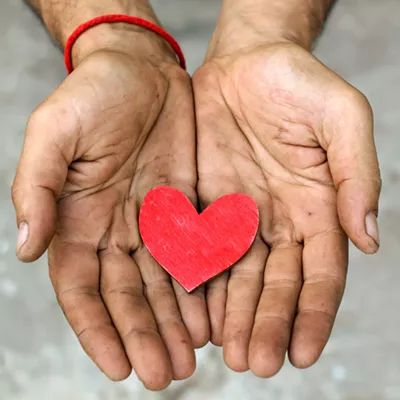
Ofir Engel refuses to be called a “hostage.” The 19-year-old Israeli instead sees himself as a “captivity survivor,” he said.
Engel was sharing his ordeal as a captive of Hamas for nearly two months via Zoom and email exchange. His story is also part of the “Survived to Tell — Be the Witness,” a virtual reality education tool detailing the experiences of the survivors of the Oct. 7 massacre in Israel. A project by U.S. university students and the nonprofit organization Israel Is You, “Survived to Tell” was recently featured at UCLA and University of California, Irvine, and will be shared with 500 college campuses nationwide in 2025. That includes those in Arizona.
Reliving the experience
A recent high school graduate, Engel was visiting his girlfriend, Yuval Sharabi, and her family on Oct. 7, 2023, at Kibbutz Be’eri, in southern Israel near the Gaza Strip.
The visit was fun, peaceful and calm, he said — until they heard sirens. The family moved into the safe room and passed the time planning a trip to Eilat, a resort town on the Red Sea. They tried not to panic, convincing themselves that the Israeli Defense Forces (IDF) would rescue them.
Engel sent messages to his father, Yoav, to let him know what was happening every 10 minutes.
“How ignorant we were,” he recalled. “That morning, everything about my time at Kibbutz Be’eri changed for me.”
After a seemingly never-ending brutal game of tug of war, terrorists broke through the safe room’s door and captured Engel as well as Yossi, Yuval’s father. Yuval and her mother were left behind. Terrorists burned their house down on Oct. 7.
Engel spent 53 days in captivity with Yossi until they were separated. Yossi was murdered on day 100, he said. The teen was released as part of the only hostage exchange on Nov. 29, 2023.
A little over a year later, Engel spent a week in Los Angeles and Orange counties sharing his story of survival to college students — his peers — via “Survived to Tell — Be The Witness.”
“I am still trying to make sense of what happened to me and do whatever I can to campaign for the return of the 101 hostages still remaining in captivity,” Engel said. “I may be safely home, but my nightmare continues. Upon my release, I learned that after 97 days from that fateful morning, Yossi, Yuval’s father, was killed in Gaza, which is where his body remains, along with Yuval’s uncle Eli Sharabi, who was also kidnapped from Be’eri, and he still remains a hostage in Gaza.”
The LA trip included visits to UCLA and UC Irvine. His publicist, Dionne Taylor, said Engel wanted to visit universities and colleges because the students can relate to him, considering they’re the same age.
“Through telling his story and using the VR, this will change perceptions,” Taylor said. “That’s the point. They survived to tell their story.”
Engel called these speaking engagements his form of therapy.
“I see so many kids my age all over the world in university championing terror,” said Engel, who lives in Kibbutz Ramat Rachel near Jerusalem. “They don’t know what happened to me. They don’t know that this could happen to them, too. I need the world to know. I am just a kid. I went through hell, but I am still fighting to help bring back the 101 hostages.”
‘A regular young adult’
Engel described himself as “a regular young adult” who loves hanging out with his friends.
“I love playing basketball, and I love spending time with my girlfriend, Yuval.”
He recalled his experiences the day he and Yossi were taken hostage. “After one and a half hours in the safe room, we soon met our fate. We could hear Hamas terrorists inside the house screaming, ‘Burn the house down’ followed by intense gunfire. We sat in silence.”
By 12:30 p.m. that day, “a barrage of banging on the door filled us with dread, and we fought off as best as we could against the terrorists from entering the safe room. In our safe room, we have no locks on the door, because they’re not designed for this. They’re designed to protect us from bombs and rockets — not people.”
After six hours, they heard a “big bomb at the door” and the terrorists opened the door.
“As they tried to open it, we tried to close it,” he explained. “Then they successfully opened the door.”
He added in a statement, “When the terrorists entered the room — I can’t put into words the feeling that ran through my body. It was like a tsunami. They entered the safe room, took one look at Yuval’s dog and shot him dead in front of us. In the VR video, you can see his remains still splattered on the floor. We thought we would be next.”
What happened next was harrowing. They pulled Yossi, Yuval’s uncle Amit and Engel outside and held them at gunpoint.
“They tied our hands behind our backs and made us watch them shred and burn the Israeli flag, he said. “Their faces filled with glee. They then moved us through the kibbutz to another area outside where we sat side by side with a group of other residents, also with their hands tied and held at gunpoint. I was sitting next to Yuval, both of us were terrified not knowing what was going to happen next. It felt like forever, but it was probably just a few minutes.”
Engel said he was at the terrorists’ mercy, as his hands were tied. They loaded Yuval, Yossi and Engel into a vehicle but, at the last minute, decided to free Yuval.
“This was the last time I was certain I was ever going to see her,” he said.
“And I still don’t know why they removed her from the car, but the last words I heard her say to me was, ‘I love you.’”
The road to Gaza
While the terrorists were driving erratically to Gaza, Engel saw dead bodies on the road and throughout the Kibbutz. During the 20-minute drive to Gaza, Engel, Amit and Yossi did not speak, as they were bewildered and shocked.
As they passed through the breached fence on the way to Gaza, Engel said he saw “thousands of Gaza civilians running toward the kibbutz and looting and emptying houses to steal as many things as they could.
“In the distance, I could hear a huge explosion, which I later found out was a military helicopter.
“Eventually, we were taken into a house and paraded in front of dozens of Gazans to see us — like we were an animal in a zoo.”
The men were inspected to ensure they did not have GPS tracking devices. The terrorists repeatedly asked Engel his name and age, and if he was in the army.
“One of the terrorists was so proud of his new captive that he invited his mother to come and inspect his new victory,” he said. “Me, an innocent Israeli teenager. I felt so scared and helpless.”
For the next few hours, more terrorists came into the home and taunted him, saying they were going to abuse and then murder him.
“I remember the look in their eyes,” he said. “It was not human. They are not human.
“I can remember that we were on the sixth floor of a building and we were accompanied by 12 other armed terrorists. We were verbally abused, and they said shameful things about Israel. One such terrorist had a weird obsession with me and spent hours just staring at me.
“I have no idea how this was even possible, but that night I fell asleep. During the night, we were guarded by four armed terrorists and they ensured we couldn’t escape, as they had our legs pinned down to the ground. We stayed like this for 26 days.”
Engel said he was confined to a small room with a mattress. Those in captivity were given cards to pass the time, and the terrorists insisted that they play “hand rami.” Engel quickly learned the rules and figured out how to outsmart them.
The prisoners were fed only pita, cheese and preserved meat in small bits. They were given a quarter of a bottle of water daily to drink. If Engel wanted to go to the bathroom, he needed to ask permission. He could hear gunfire and explosions, adding to the stress on his already-fearful mind.
Living in fear
On the 27th day, Engel said the three men were relocated to the home of a terrorist’s commander. The terrorists told Engel he would be dead soon.
During the Zoom call, Engel was stoic when he said, “They told me that my family had given up hope that I was alive. I would never see my family again and I would die in Gaza. They told me this every day until the 40th day in captivity.”
While Engel was held captive in Gaza, he was sure his girlfriend, Yuval, had been murdered or taken hostage, too.
The terrorists forced Engel to say on camera that they were treating him well and that the time in captivity was tolerable. He said that none of it was true, and the video has not been released.
Eight days later, the terrorist commander asked Engel to write his will and a goodbye letter, as they were planning to execute him, he said.
On the 53rd evening, “together with Yossi and Amit we were told that we were moving again, but this time we were separated. We had spent 53 days of unimaginable terror together, but after this night only, Amit and I were taken to a new home. This was the last time I saw Yossi, my girlfriend’s father.
Harrowing hours before release
“They told us that we were being taken back to Israel, and we were convinced that this was a sick joke. They then loaded us into a vehicle with other strangers and one woman quietly whispered to me, ‘Do you speak Hebrew?’ I thought I was hallucinating and then I quickly realized she, too, was held in captivity. They held eight of us in a home together for a few more hours and gave us as much food, drinks and sweets as we wanted. They wanted us to look healthy for our return to Israel.”
Later that night, 200 terrorists accompanied the hostages in a van to meet the Red Cross. They were transported to the Rafah crossing in Egypt and then to Israel.
“I can remember thinking that I was certain I would be meeting my family, but still convinced that Yuval and the remaining members of her family were all dead,” he said.
“When I saw the first soldier, I asked if he knew about Yuval, and for the first time in 54 days, I broke down crying like a baby at the relief that she was, in fact, alive, and in Israel. She was never taken as a hostage, but lived with the pain and uncertainty that both myself and her own family were in captivity.”
A reunion
In “Survived to Tell — Be The Witness,” viewers see the reunion between Engel and his parents, as well as Yuval, at Schneider Hospital. He was there for a week under observation.
“I did the video project so (people) can understand the situation and what happened on the 7th of October,” Engel said. “You can feel you’re in the place. It feels very, very realistic. We had terrorists come to Israel and kidnap kids, women and old people. They didn’t just take soldiers. If they lived in Israel, in the same day, in the same place, they can get kidnapped, too.”
“Survived to Tell — Be the Witness”
israel-is.org/en/survived-to-tell/











